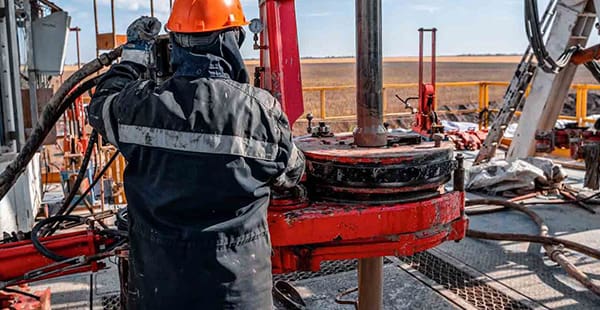How Are Oil Refinery Workers Exposed to Asbestos?
Oil refinery workers used asbestos materials to convert crude oil into petroleum products. They often used and worked around insulation, adhesives and fire-resistant clothing that contained asbestos fibers. If these fibers are inhaled, they can cause asbestos diseases like mesothelioma.
Before the 1980s, asbestos was commonly added to materials to improve heat and chemical resistance. Asbestos also improved the durability of refinery equipment.
Oil refinery employees could come in contact with the dangerous material in a number of their day-to-day tasks. For example, when asbestos gaskets are removed for maintenance or repair, asbestos dust can be released.
Today, oil refinery workers may still risk occupational asbestos exposure. Some oil refineries may have old pipes and machinery with asbestos parts.
What Asbestos Products Put Oil Refinery Workers at Risk?
Oil refinery workers may experience asbestos exposure from the following products:
- Asbestos insulation
- Ceiling tiles
- Cement
- Cement sheets
- Drywall
- Electrical wires
- Fire-resistant clothing
- Flanges
- Floor tiles
- Gaskets
- Mastic
- Packing
- Pipes
- Pumps
- Roofing
- Rope
- Sealants
- Valves
When these products are damaged, sanded, scraped or improperly removed, asbestos dust may be released into the air. Asbestos in the air creates an exposure risk to the person working with the asbestos-containing materials and nearby workers.
Several companies manufactured asbestos products that posed a danger to workers. The following asbestos companies supplied products to oil refineries.
Many petroleum companies such as Chevron and Texaco, ExxonMobil and Standard Oil Company. used asbestos products at their facilities. These companies may also be liable in asbestos exposure cases because they did not protect workers.
Common Places Oil Refinery Workers May Find Asbestos
Asbestos products were most commonly found in areas with high temperatures and pressure. Locations in the workplace that often exposed oil refinery workers include:
- Boiler rooms
- Cracking units
- Distillation towers
- Dryers
- Furnaces
- Ovens
- Pump rooms
- Reactors
- Shipyards
Asbestos could also be found in the clothing oil workers wore for protection. Asbestos clothing and protective equipment were meant to prevent burns and chemical exposure. However, some protective clothing exposed workers to asbestos.
Oil Refinery Workers and At-Risk Trades
Many workers at oil refineries may have experienced asbestos exposure. At-risk trades in the oil refinery industry include:
- Boiler operators
- Boilermakers
- Bricklayers
- Construction workers
- Electricians
- Engineers
- Furnace operators
- Industrial workers
- Insulators
- Machinists
- Maintenance workers
- Mechanics
- Millwrights
- Pipefitters
- Shipbuilders
- Steamfitters
- Steel workers
- Welders
Family members of oil refinery workers are also at risk of asbestos exposure. If workers bring asbestos dust home on their clothing, loved ones may experience secondhand exposure.
Secondhand exposure was and is common among family members who launder or handle work clothing of asbestos workers.
Resources for Mesothelioma Patients
Mesothelioma Risk for Oil Refinery Workers
Oil refinery workers exposed to asbestos are at risk of developing asbestosis, lung cancer or mesothelioma. Due to widespread asbestos use in the industry, oil refinery workers are at higher risk of exposure than the general population.
A 1991 study indicated as much as 90% of oil refinery workers had direct or indirect contact with the mineral. Because of mesothelioma’s long latency period, people exposed decades ago may still develop the disease.
Several studies provide evidence of the high rate of asbestos illness among oil refinery workers:
- Researchers looked at more than 10,600 refinery workers over more than 50 years. They found significantly higher mesothelioma mortality rates among maintenance workers at refineries.
- One study looked at mesothelioma mortality in the United States between 1995 and 2015. Researchers found oil refinery workers had the second-highest mortality rate among over 200 industries.
Today, Occupational Safety and Health Administration (OSHA) regulations protect petroleum workers from asbestos. However, some workers may still be exposed to lingering asbestos materials at jobsites.
Compensation for Oil Refinery Workers With Occupational Asbestos Exposure
Oil refinery workers may be eligible to seek compensation through asbestos lawsuits. People affected by asbestos diseases, including workers and families, have successfully sued companies responsible for asbestos exposure.
Successful lawsuits involving oil refinery workers include:
- $25 million for efficiency expert and his wife: A California jury awarded a man and his wife $25 million for injuries caused by his testicular mesothelioma. The patient worked as an efficiency expert at refineries where asbestos was present. The jury found liable two companies that performed construction on facilities where the patient worked.
- $4.5 million for refinery worker and his family: A Washington lawsuit resulted in an agreement between a former refinery worker and a maintenance contractor. The mesothelioma patient worked at the Texaco Oil Refinery in Anacortes, Washington. The contractor company that performed construction work at the refinery agreed to give the patient and his family $4.5 million.
- $1.5 million for refinery worker’s family: In a wrongful death lawsuit, a California jury awarded the family of an oil refinery worker $1.5 million. The worker was employed at Standard Oil Company and was exposed to asbestos through insulation and other products. The jury found Crown Cork & Seal Company liable for the worker’s death from mesothelioma.
Some companies that caused exposures at refineries have set up asbestos trust funds to pay present and future victims. J.T. Thorpe, NARCO/Honeywell and others have set up these trusts as part of restructuring plans after they declared bankruptcy.
Refinery workers and family members can find mesothelioma law firms throughout the country. Lawyers at these firms have years of experience handling asbestos lawsuits. They can file and litigate lawsuits and trust fund claims on behalf of victims.









